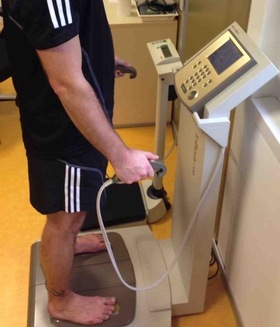Temperature-Based Bioimpedance Correction for Water Loss Estimation during Physical Exercise
Abstract

The amount of total body water (TBW) can be estimated based on bioimpedance measurements of the human body. In sports, TBW estimations are of importance because mild water losses can impair muscular strength and aerobic endurance. Severe water losses can even be life threatening. TBW estimations based on bioimpedance, however, fail during physical exercise because the increased body temperature corrupts bioimpedance measurements.
Therefore, we propose a machine learning method that eliminates the effects of increased temperature on bioimpedance and, consequently, reveals the changes in bioimpedance that are due to TBW loss. This is facilitated by utilizing changes in skin and core temperature. The method was evaluated in a study in which bioimpedance, temperature, and TBW loss were recorded every 15 minutes during a two-hour running workout. The evaluation demonstrated that the proposed method is able to reduce the error of TBW loss estimation by up to 71%, compared to the state of art.
This approach – in combination with portable bioimpedance devices – could facilitate the development of wearable devices for continuous and noninvasive TBW loss monitoring in the future.
Data
The data is available at PhysioNet.
Publications
- , , , :
A Two-Stage Regression Using Bioimpedance and Temperature for Hydration Assessment During Sports
22nd International Conference on Pattern Recognition (ICPR 2014) (Stockholm, 24. August 2014 - 28. August 2014)
In: IEEE (ed.): Proceedings of the 2014 22nd International Conference on Pattern Recognition (ICPR) 2014
DOI: 10.1109/ICPR.2014.773
BibTeX: Download - , , , , :
A Temperature-Based Bioimpedance Correction for Water Loss Estimation During Sports
In: IEEE Journal of Biomedical and Health Informatics 20 (2016), p. 1477-1484
ISSN: 2168-2194
DOI: 10.1109/JBHI.2015.2466076
BibTeX: Download
